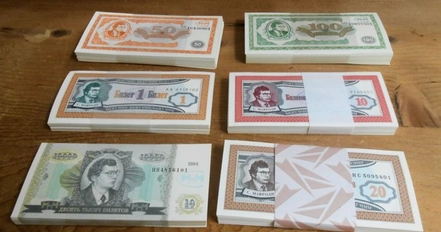In 1990s, when the communist rule was over in Russia and the economy was trembling and people were looking for a ray of hope in capitalism, which was also failing them, Sergei Mavrodi had some plans. Sergei, along with his brother Vyacheslav Mavrodi, and friend Olga Melnikova created a pyramid corporation named MMM (the name came from the initials of three founders) in 1989. The purpose of MMM, in the beginning, was probably not to cheat people but be a genuine corporation in the business of importing electronics goods in Russia and selling them. What inspired Sergei to cheat millions of people is still unknown.
The pyramid scheme started taking shape in early 1994 when the company announced that it will be offering a much better interest rate to its investors as compared to public and private banks in Russia. Initially, they convinced a few people to invest a small amount in the company. And their money got doubled in a very short period of time. The returns on the investment were made in days' time. The news of the corporation and its generosity spread like a wildfire through the word of mouth. Russians were already confused about how to save their money or attain economic stability amidst the economic turmoil plaguing the country. A lot of people decided to invest money in MMM to see it get doubled or tripled. Along with the popularity through word of mouth, MMM started running ad campaigns in Russia's leading newspapers and on state television. Soon, each and every Russian knew what MMM was and what they do. With lucrative interest rates and returns, nobody bothered to ask how MMM was making profit. In reality, they were not. They were just taking money from one investor and giving it to the investors who invested earlier. The only people getting rich with this scheme were Mavrodi and his family.
Soon, the shares of the company hit the skies. By July 1994, an estimated 5 to 10 million people had invested in MMM. The rate of interest at that time was 10% a week. But this mammoth growth of the corporation in such a short period of time rang alarms with the government and in the month of July, the finance ministry released a statement asking people not to invest in companies like MMM who does not offer any insurance on the money invested. Meanwhile, the shares of the company rose from 1600 Rubles in February to 115,000 Rubles in the month of July. That's when Mavrodi came up with the idea of "biletov" or "Mavrodki", or as referred to in the modern-day world, "MMM banknotes." Mavrodi started offering part shares to the investors in form of biletovs where 1 biletov was equal to 870 Rubles and 100 biletovs constituted 1 share of MMM.
There were three series of biletovs printed, all bearing the image of Mavrodi in the front and with the text "MMMBILETOV" repeated in Russian. The first series of biletov consisted of 7 denominations, 1, 10, 20, 50, 100, 500 and 1000. The second series consisted of 4 denominations viz., 1, 100, 1000 and 100000 biletov. And the third series also consisted of 4 denominations of 10, 50, 500 and 1000 biletov. Biletovs was designed in the shape of banknotes. The paper used in some of the denominations was similar to that of normal banknotes while the paper used in some was cheap. Some of the higher denomination banknotes also had a few security features. Since the stocks of MMM were not listed on any exchange market and the company used to decide the price of its shares, the value of biletovs used to be flexible all the time.
In mid-1994, biletovs became an unofficial currency in Russia and people used to even transact using biletovs. Some of the 500 biletovs notes from the last series contained a stamp saying "Not convertible to cash" in Russian. Even though no hard evidence exists, it's believed by many that Russian government either asked MMM to put this stamp on the bond or they did it themselves so that people cannot use them as a mode of transaction and horde them in the form of black money. At that time, 500 biletovs were equal to 475,000 Rubles.
In August of 1994, Mavrodi, who was the sixth richest man in Russia at that time, was arrested by the government for tax evasion. MMM shareholders, many of who were people with power, wrote a petition to the Russian prime minister to release Mavrodi so that he can compensate the people of Russia whom he defrauded. He was subsequently released, but the amount of money refunded was meagre as compared to the amount lost. MMM owed an estimated 100 billion to 3 trillion Rubles to approximately 5 to 10 million people of Russia. No official data of the exact number of people and the exact amount of money owed exists. The Russian court could only fine him for 100 million Rubles.
Biletovs are still fairly common in the numismatics market as Russian who were defrauded decided to keep the bonds in the hope of getting their money back in the future. But nothing was returned to them. In the aftermath, at least 50 of the investors in the MMM corporation committed suicide. After this scandal, the Russian stock market became stricter with more regulation on any joint-stock companies but the harm was already done.


